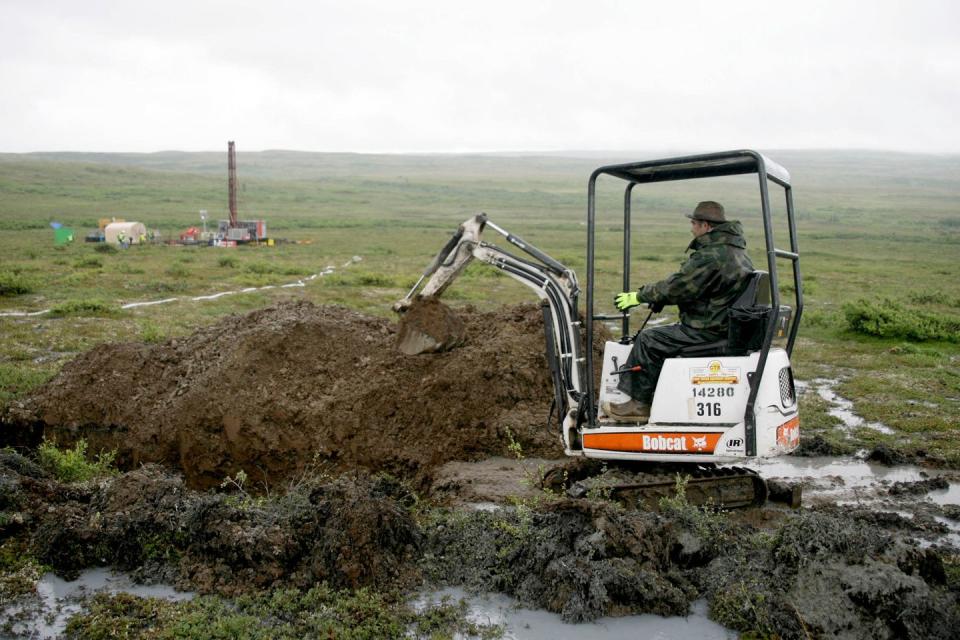Republicans Stay With Trump Because He's the President* They've Been Waiting Their Whole Lives For

It is now a safe assumption that El Caudillo del Mar-a-Lago doesn't really know anything about anything, but that, in those few places in the Executive Branch he's left undecimated, he's letting people who hate those places run completely amuck. That's a big part of why Republicans refuse to Scaramucci his considerable hindquarters into oblivion. He's turned what Steve Bannon called "the administrative state" into a toxic playground for the worst of the American corporate class.
Over the weekend, for example, he greased the skids for the construction of the Pebble Mine in Alaska, an environmental disaster in waiting that threatens the Bristol Bay in Alaska, which happens to be the one of the most valuable salmon runs in the world. Alaskan environmental groups have been fighting this massive project for years and, up until now, the EPA has been on their side. From CNN:
The news came as a "total shock" to some top EPA scientists who were planning to oppose the project on environmental grounds, according to sources. Those sources asked to remain anonymous for fear of retribution. The copper-and-gold mine planned near Bristol Bay, Alaska, known as Pebble Mine, was blocked by the Obama administration's EPA after scientists found that the mine would cause "complete loss of" the bay's fish habitat.
EPA insiders tell CNN that the timing of the agency's internal announcement suggests Trump was personally involved in the decision. Dunleavy met with Trump aboard Air Force One on June 26, as the President's plane was on the tarmac in Alaska. The President had stopped there on his way to the G20 summit in Japan.
From his perch squarely in the pocket of Alaska's mining interests, Governor Mike Dunleavy dished out the usual Republican pablum.
In response to CNN's question about whether Dunleavy asked Trump to direct the EPA to lift the restriction during the June meeting, Dunleavy's press secretary said the two discussed mining and a public land order, but he declined to provide specifics of the conversation. Dunleavy said in a statement, "This project, like all projects, should be scrutinized and examined under a fair and rigorous permitting process prescribed by law. That was not the case under the EPA's unprecedented preemptive veto." Neither the White House nor the EPA responded to CNN's question on whether the White House directed the EPA to lift the restriction on the mine.
Needless to say, there was nothing preemptive about EPA's previous opposition to the mine. The effects of the mine on Bristol Bay and the salmon fishery had been studied for a decade before the EPA announced its opposition to the project. The available evidence was that this determination was reversed after the president* and Dunleavy had a bit of a chat on Air Force One. Now that's preemptive.
The same day Trump and Dunleavy met in June, the EPA publicly announced that it would begin reconsidering whether to withdraw the Clean Water Act restriction on the Pebble Mine. EPA scientists and staff believed that they would then have weeks or months to reassess previous findings and potentially permanently stop the project, according to the sources. Instead, immediately after Trump met with Dunleavy, EPA officials received an invitation from EPA headquarters to attend the video conference the next day, June 27.
During that video conference, EPA General Counsel Matthew Leopold said that a decision had been made to lift the restriction on the Pebble Mine proposal and that no further consideration of the matter was needed, sources said. "I was dumbfounded," an EPA insider said. "We were basically told we weren't going to examine anything. We were told to get out of the way and just make it happen."

On Monday, having dealt with the salmon, the administration announced that it was taking a chainsaw to the Endangered Species Act. From The New York Times:
The changes will make it harder to consider the effects of climate change on wildlife when deciding whether a given species warrants protection. They would most likely shrink critical habitats and, for the first time, would allow economic assessments to be conducted when making determinations. The rules also make it easier to remove a species from the endangered species list and weaken protections for threatened species, a designation that means they are at risk of becoming endangered. Overall, the new rules would very likely clear the way for new mining, oil and gas drilling, and development in areas where protected species live.
So, with this decision, which is awful in its own right, along with the decision to reduce the Department of Agriculture's scientific research arm by attrition, the administration* is going to embed climate denialism into the "administrative state" by fiat. The oceans, of course, won't care. And neither will the glaciers. The eagles will have a beef. Let's listen to a couple of the vandals talk Republican for a minute.
Interior Secretary David Bernhardt said the changes would modernize the Endangered Species Act and increase transparency in its application. “The act’s effectiveness rests on clear, consistent and efficient implementation,” he said in a statement Monday. Commerce Secretary Wilbur Ross said in a statement the revisions “fit squarely within the president’s mandate of easing the regulatory burden on the American public, without sacrificing our species’ protection and recovery goals.”
These arguments could have been made—and have been made—by any Republican Cabinet member going back to the administration of Ronald Reagan. This didn't start with the current president*. It has been on the Republican wish list ever since the party's power base swung south and west. Why do they stay with him? He's the president* they've waited their whole lives for, that's why.
Respond to this post on the Esquire Politics Facebook page here.
You Might Also Like

